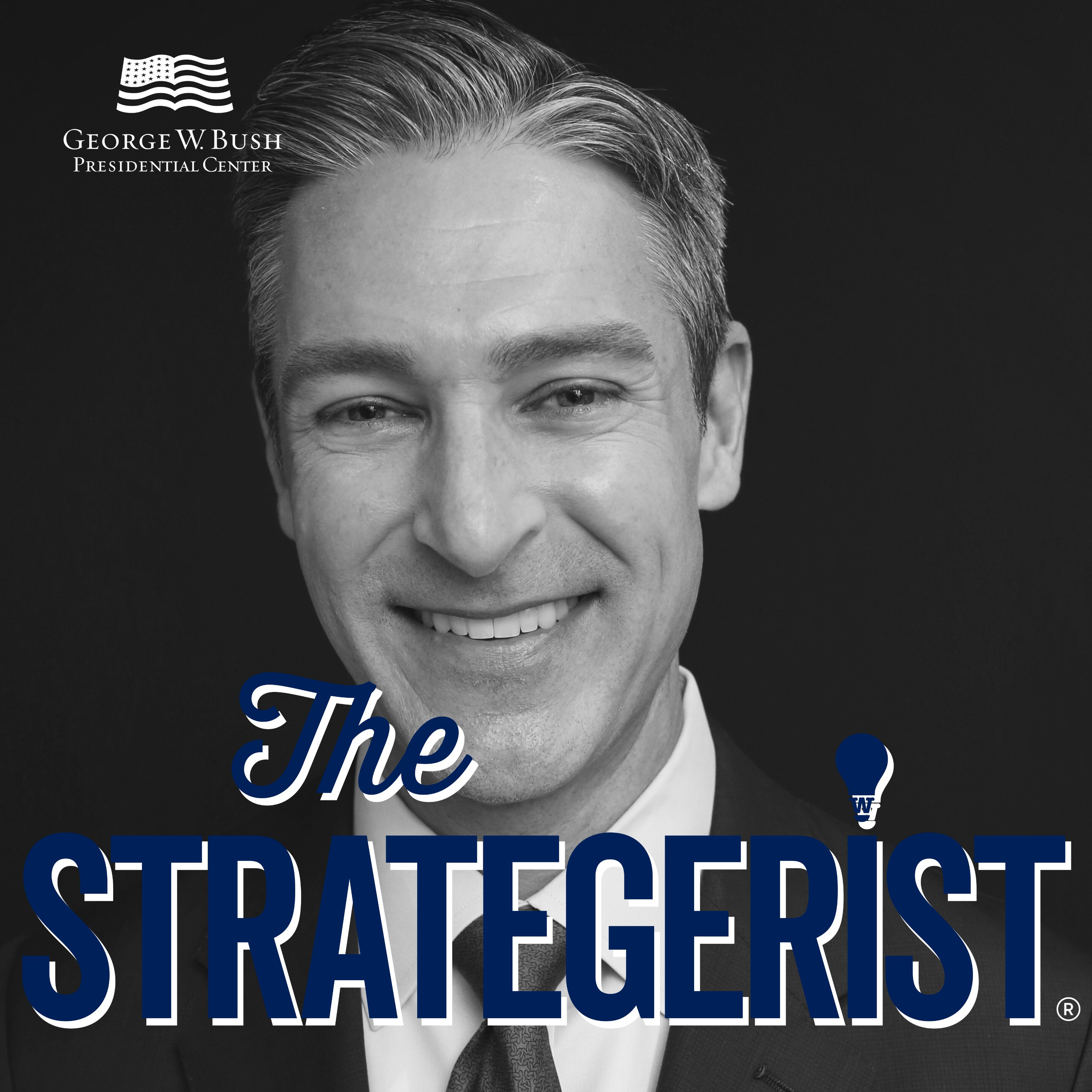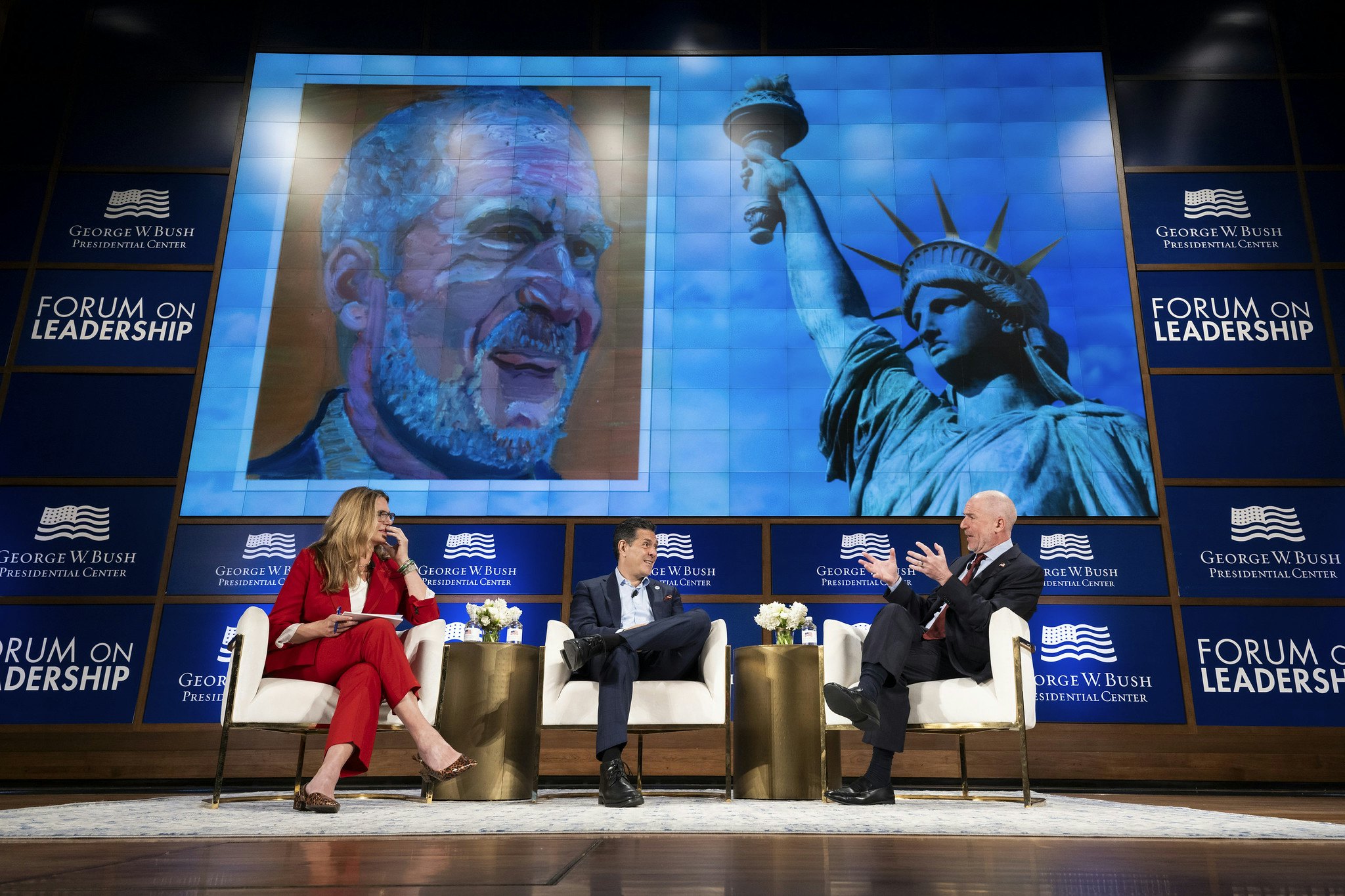Luma Simms, a fellow at the Ethics and Public Policy Center, describes learning how to describe her identity, what the American identity should include, and how she synthesizes each day her American self and her Iraqi self.
Luma Simms is a fellow at the Ethics and Public Policy Center, where she writes frequently on immigrant life and thought. She is particularly concerned with the crisis of rootlessness, identity, and dehumanization. A native of Iraq, Simms came to the United States as a young girl and grew up in California. Now an Arizona resident, her work on immigration and other topics has appeared in such publications as National Affairs, The Wall Street Journal, and The Federalist.
Simms spoke with Chris Walsh, Senior Program Manager for the Human Freedom Initiative at the George W. Bush Institute, and William McKenzie, Senior Editorial Advisor at the Bush Institute, about learning to define her identity. She details what the American identity should include. And she explains how she works each day to synthesize her American self and her Iraqi self.
Let us start with your experience as an Iraqi immigrant to the United States. What did you mean when you wrote: “I have found assimilation to be more of a revolution than an adaptation”? What has the process been like in defining your identity?
There is evolution and revolution. Every transplant to new soil undergoes one of the two. Evolution is adapting to a new environment to survive and possibly flourish. Revolution is rejecting the old for the sake of the new; destroying the old to create the new.
For some immigrants it is only a matter of evolution. For me — for many — I had to revolt against myself, I had to reject myself in order to create a new self that is able to function within this new habitat — America. Every immigrant evolves or revolts to one degree or another — consciously or unconsciously. Those that can do neither stay rootless.
I had a double experience of alienation: from Iraq to Greece, where we lived as refugees, and from Greece to America. The principal difficulty for me was not just that I had to learn English or that there were some different rules within this culture. The principal difference was that as an immigrant you are uprooted, cut off from everything that makes you who you are — from your family, culture, traditions, communal spheres; your entire view of the world is riven. And then you are transplanted into a culture that has a different understanding of life, of the human person, of home and family.
This revolutionary shift of worldview was very difficult.
As an immigrant you are uprooted, cut off from everything that makes you who you are — from your family, culture, traditions, communal spheres; your entire view of the world is riven. And then you are transplanted into a culture that has a different understanding of life, of the human person, of home and family.
What helped you develop a sense of attachment to a new place?
Even to this day, I don’t feel rooted. That doesn’t happen to everybody, but it happens to quite a few people. And it happened to me particularly. Maybe that is because of my philosophical bent or introspection.
Feeling rooted is not just about a home or the fact that I lived in California and now live in Arizona. I do not feel a cultural connection. I did for a while. In the Orange County of the late 1970s and early 1980s, there was a very strong culture. It was mainly Protestant and very Republican. It had such a strong identity that immigrants understood who these people were and wondered how they could become one of them.
On top of that, there are two competing views in America of what happens when immigrants come to the United States. One is that immigrants need to assimilate completely. The demand is not only to speak our language and follow our laws. You need to only value our values. But what are American values? Americans differ on that question. This kind of assimilation is revolution.
Others take the position that you are welcome to this country, but you don’t have to make a lot of changes. You don’t even have to learn the language. Sets you up for alienation. Rootlessness in perpetuity.
For a while, it was easier for me to assimilate when we lived in Southern California. And I did that by trying to become Protestant and Republican. I did that by aligning the idea of who I am into those things. But because of life experiences — my maturity, my growth spiritually and politically — I found myself adrift again.
What I have attempted to do since December 1978, when I came to America, is to shrink the distance between my Iraqi self and my American self. I do feel American. I would definitely say that I am an American, but I don’t always know what that means. I am still grateful for this country, it took me in. But I cannot deny the way I was raised, who I am, my blood.
What I have attempted to do since December 1978, when I came to America, is to shrink the distance between my Iraqi self and my American self.
People are afraid to talk that way. But this is about everything that makes me who I am and the way my parents raised me and the religious background I came from. Those values have often been in opposition to American values — moral values in particular.
I’ve had to learn how to bridge that gap and how to, not assimilate, but to synthesize the two selves. Every day I work on it, I hope I’m doing a good job. That’s why I write about this process.
I’ve had to learn how to bridge that gap and how to, not assimilate, but how to synthesize the two selves. Every day I work on it, I hope I’m doing a good job. That’s why I write about it.
It’s dangerous to write because people like us can quote your words back to you. So, I’m going to ask what you mean by this statement: “I believe there can exist both a path for assimilation, which allows immigrants to keep part of their identity, while still becoming good and loyal citizens of this country.” How do you achieve that without creating a nation of parallel universes?
That is very difficult, and there are many parts to that answer. I’m going to concentrate on one area: multiculturalism and ethnic subcultures. Within multiculturalism, it is okay to have separate universes. And anti-multiculturalists say that any holding on to your heritage, even cuisines, undermines the country or culture.
But multiculturalism has been successful for a reason. I was never in favor of it, but as I’ve grown, and as I’ve studied and thought about this, I see how the two sides of this debate can meet.
If Americans had a stronger sense of who they are and accepted themselves and allowed immigrants to have those ethnic groups, the two sides can co-exist when two things happen. First, the immigrants do not use their ethnicity to harm their new country — the transplants should not uproot the native plants. And second, if Americans are willing to learn about their own heritage, espouse it but do not make immigrants feel like they have to destroy themselves in order to become Americans — create a soil deep and rich enough to accept new transplants and help them adapt.
There is a rootlessness in our culture that causes some Americans, especially young ones, to not know who they are and where they belong. They want to know, even if their parents think, “What does it matter? We’ve been here for ages.”
You’ve outlined all these challenges that come with identities, so let me add another challenge to that with religion. What did you mean when you wrote: “One of the most difficult barriers to assimilation is religiosity”?
First, those who come with strong faiths want to continue to practice their faith. When they hit upon a culture that discounts faith, that doesn’t want to bring religious principles into the public square, there’s no point of contact there — alienation between immigrants with strong religiosity and a society that sneers at it. That’s the first difficulty.
Second, there are the sorts of religions that immigrants bring with them. Each religion has a way of informing the person. So, how do those square with the American epistemology? If you have someone who believes that not everybody should have certain rights, they’re going to have a hard time operating within a culture that does treat everyone as equal.
Of course, people change. Many people who come from different religions are open to change. Yet some immigrants fear they or their children will lose their religion. Many do. Some parents fear the democratization of their children because they fear them being pulled away from the beliefs of home and the local ethnic church.
What strategies might help overcome some of these barriers to assimilation?
That’s hard. This is not just about policies. It’s about a real cultural change within America herself.
What immigrants often think that Americans mean by the word “assimilation” is that the immigrant has to change and adapt to a culture that it has taken America almost 245 years to become. They are expected to espouse the current culture, but the current culture is largely libertine, opposed to traditions.
If Americans talk about assimilation in terms of, “We do not resent your ethnic heritage, culture, and religion, and we will not see it as an enemy of us,” that softens the immigrant to think “I don’t have to deconstruct my very being to become this idea of American.”
If Americans talk about assimilation in terms of, ‘We do not resent your ethnic heritage, culture, and religion, and we will not see it as an enemy of us,’ that softens the immigrant to think ‘I don’t have to deconstruct my very being to become this idea of American.’
Then, the question is, “What do you want me to assimilate to?” If Americans themselves feel uprooted, that their lives do not have meaning, that our current political climate and culture have difficulties, there is nothing for the immigrant to grasp onto. How can an uprooted person assimilate to a population that is itself uprooted?
In an earlier America, no matter the background of the immigrant, there was some point of contact. Family was valued by both. Religion was valued by both. Hard work was valued by both.
What newer immigrants do today, then, is live in neighborhoods and cities that are filled with people of their own heritage. They build churches and restaurants, they have ethnic food stores, and they build a community. They might work with other Americans. They may, most likely, send their children to school. But often they have to undo everything the school is doing at home as my parents attempted to do with me. They have to undo the libertinism taught in schools.
I’m struck by your point about people who were born in this country trying to figure out what being an American means. How do you define being an American?
I write what I write because I’m still probing that question. I’ve come to realize that America will not be the idea of what I want a nation to be. I’ve come to that realization because America is not one people. I have accepted that. I don’t like it. I want consistency. Because of my desire for roots and stability, I want there to be a unity within a people.
Many elite editors of magazines believe that the American identity is that there is no identity. Just come here and work, enjoy life, make some money, and raise a family. Do whatever you want.
But if the goal is to have an American identity, we have to talk about what that identity would look like. Historically, ideas alone do not make a national identity. But I believe a partial American identity would be a country of people that, first, stand firm and believe and espouse and live out the Declaration of Independence. Ideas alone don’t make an identity; they must be embodied.
For me, that’s a primary document. And, personally, more important than the Constitution. I am not saying the Constitution is unimportant, but I believe the fundamental idea of what American is is found in the Declaration. That needs to be taught, explained, and lived out.
After that, you have to reintroduce the value of family, religion, and the idea of plurality. Those three things, Alexis de Tocqueville said, could make democracy in America work, and he had hopes that it would work. That is an America that believed and lived out the Declaration of Independence and that it stuck to family and religion. Only then, did he say, that democracy in America would survive and would not disintegrate into what he called soft despotism.
An America that is accepting of other ethnicities without warring within, but bringing in immigrants, teaching them to value the Declaration of Independence, and affirming their belief in family and religion while they themselves are living out those beliefs. You may have a different religion, but at least you agree on those things. You agree not to demonize the other.
How important is it for assimilation to occur within nations if they desire democratic stability?
In France, they say you can come and have your own religion, but you keep it to yourself and in your home. When you’re in France, you are a Frenchman. Religion is no part of being a Frenchman, and ethnicity almost has to be hidden. That is a more harmful multiculturalism, not a harmonious one. That’s breeding ground for parallel universes.
For a harmonious multiculturalism to occur, you have to teach civics in the schools. You will go nowhere if you don’t teach that.
You also need to show immigrants that they are valued. These are uprooted people looking for stable soil. That’s how a nation gets the stability it desires.




























